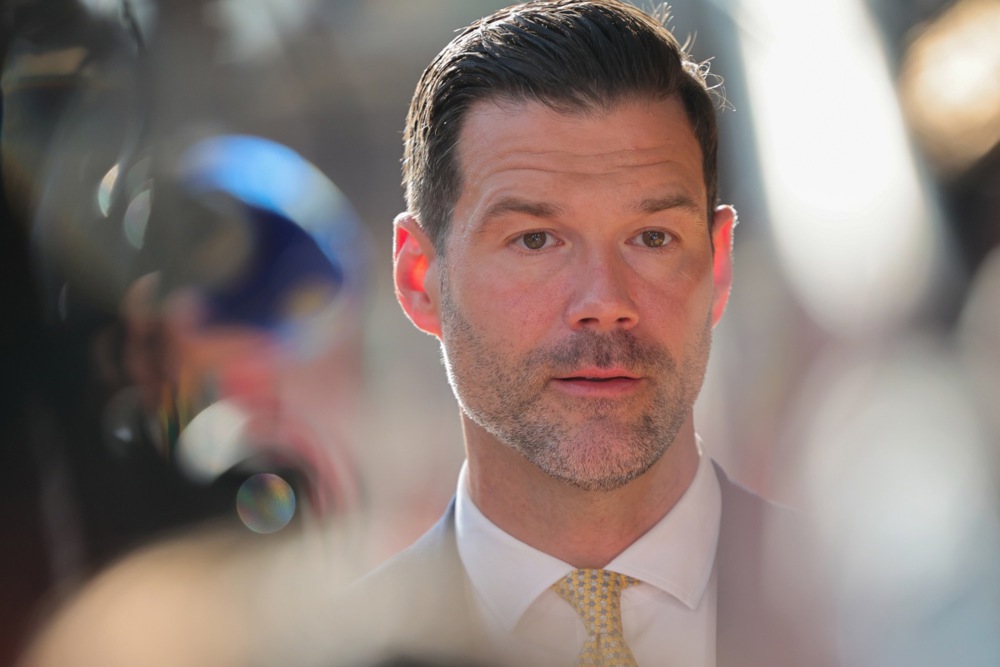Story reposted with corrected graphic
Europeans were much more negative than other regions about the incoming American president, according to a large-scale survey by the European Council on Foreign Relations.
Many countries in the rest of the world were more upbeat about the second Trump presidency, believing the next president would reduce tensions in Ukraine, the Middle East, and between the US and China.
“Europeans are almost alone in mourning Trump’s election”, the ECFR said after surveying 28,549 people across 24 countries.
Even “Ukrainians are slightly more positive than not about the impact Trump might have on ending the conflict with Russia”, the ECFR noted.
However, respondents in Ukraine were “deeply conflicted about what could be an acceptable compromise settlement with Moscow”, it found.
Europeans and South Koreans were much more pessimistic about a second Trump presidency, instead viewing it as a further weakening of the geopolitical “West”.
Many people in other regions of the world “believe the president-elect is committed to ending wars in Ukraine and the Middle East”, said the ECFR.

Perhaps surprisingly, many of these respondents also regarded the EU as a world player equal to the US and China.
“Much of the world regards Europe as more powerful than Europeans themselves do. They say the European Union is able to act on equal terms with the US and China,” found the ECFR.
However, “Europeans need to recognise the advent of a more transactional world to wield the influence within their grasp,” it suggested.
“Rather than attempt to lead a global liberal opposition to Trump, they should understand their own strengths and deal with the world as they find it.”
COMMENT: Under Biden, the world has seen the hazards created by an absence of a coherent and rigorously executed concept of how the US will deploy its incomparable influence, writes @ConradMBlack. https://t.co/tzy9QCxLHa
— Brussels Signal (@brusselssignal) January 15, 2025
From India and China to Turkey and Brazil, more respondents believed Trump would be good for the US, their own country, and peace in the world, than the reverse.
South Korea was the only country outside Europe where a majority of respondents proved negative about the Trump presidency.
Both the EU and South Korea were dependent for their security on the US, the ECFR noted.
“In short, Trump’s return is lamented by America’s long-time allies but almost nobody else,” it concluded.
“Rumours have circulated for some time of the liberal international order’s slow death; this poll provides more evidence of its passing,” the ECFR added.

“The weakening of the West is visible in its dramatic failure to isolate Moscow globally after the full-scale Russian invasion of Ukraine”, said the Berlin-based think tank.
“Many countries exhibit a remarkably strong acceptance of Russia as an ally or necessary partner, despite nearly three years of Russia waging a brutal neocolonial war in Ukraine,” it said.
“…the number of Indians and Chinese who consider Russia to be their country’s ally has even marginally grown since January 2023”, it found.
Moreover, the “average American opinion of Russia has also improved, even if a majority continues to see Russia as either a rival or an adversary,” said the think tank.
In India, Saudi Arabia, Russia, South Africa, China and Brazil, the large group of surveyed respondents were labelled “Trump Welcomers”.
These viewed Trump’s election victory as good for Americans and for peace in the world.
Most Trump Welcomers also viewed the incoming president as good for their own country.
These positive attitudes possibly reflected a shift in how the world viewed the global role of the US, according to the ECFR.
“Under Trump, America will no longer aim to spread its values and act as a global defender of the liberal international order. The broad global welcome to Trump could herald the end of the US as a ‘liberal leviathan’, to recall John Ikenberry’s striking phrase,” the think tank said.
Most people around the world saw the US either as a continuing superpower or as one whose influence could still grow.
“However, people expect China—rather than America—to become the world’s strongest power,” noted the ECHR.
Majorities hold this view “everywhere except for Ukraine, South Korea, India and America itself. Even in the US, as many people say China will become the strongest country as those who say it will not,” it said.
Another striking result was in Ukraine itself, where public opinion regarding the desired outcome of the war made a big shift.
“In just half a year, the expectation of victory has plummeted from well over half those asked in May 2024 to barely more than one-third by November the same year. Most Ukrainians now say they expect a compromise settlement,” noted the authors.
Slightly more people in Ukraine believe peace is more likely under Trump than think it is less so.
However, there was no consensus in Ukraine on what constituted an acceptable compromise. These divisions could potentially ignite a political upheaval when negotiations eventually commenced.
There was also a growing division in the EU, according to the ECFR.
“All European countries are divided internally on Trump’s return—and several south-eastern European countries among the 11 EU member states in our survey stand out for their more welcoming attitudes. Indeed, it may no longer be possible to speak of “the West” as a single geopolitical actor,” it said.
COMMENT: Europe shows growing relief at Donald Trump’s return, hoping his leadership will restore stability and address the vacuum left by weak Western governance, writes @ConradMBlack. https://t.co/cv92NBp759
— Brussels Signal (@brusselssignal) December 18, 2024
The report noted three trends.
First,”Europeans are aware of their distinctive interests when it comes to relations with the US, but also with other powers. They view the US as the EU’s main friend and Russia as its main enemy, and they still broadly consider others—Turkey, China and India—to be necessary partners for the EU,” it said.
Second, people around the world saw the EU as a major global power.
“Ironically enough, the people who believe least in European power are the Europeans themselves, including the British and the Swiss,” said the authors.
In the rest of the world, many people appeared to have a positive view towards the EU, and people “broadly see the EU as both powerful and as an ally or a partner.”
In a final bit of advice, said the report’s authors, “what the EU must do to be taken seriously by Trump’s White House closely resembles what it must do to make friends and influence people globally.”
“Rather than posing as a moral arbiter of everyone else’s behaviour, Europe should build its domestic strength and seek new bilateral partnerships to defend its own values and interests in a transactional world,” they said.
Our #interview with political consultant and writer @CraigWilly06 on how the EU will deal with the incoming #Trump administration is now on YouTube.
Watch the full episode ?? https://t.co/Ron45YrcqE #policy pic.twitter.com/nNCs3LrtVM
— Brussels Signal (@brusselssignal) November 27, 2024
The poll surveyed respondents in 16 European countries (Bulgaria, Denmark, Estonia, France, Germany, Hungary, Italy, Poland, Portugal, Romania, Spain, Russia, Switzerland, Turkey, Ukraine, and the UK).
It also surveyed eight non-European countries (Brazil, China, India, Indonesia, Saudi Arabia, South Africa, South Korea, and the US).
The report summarising the poll’s results was written by foreign policy experts Mark Leonard, Ivan Krastev and Timothy Garton Ash.





